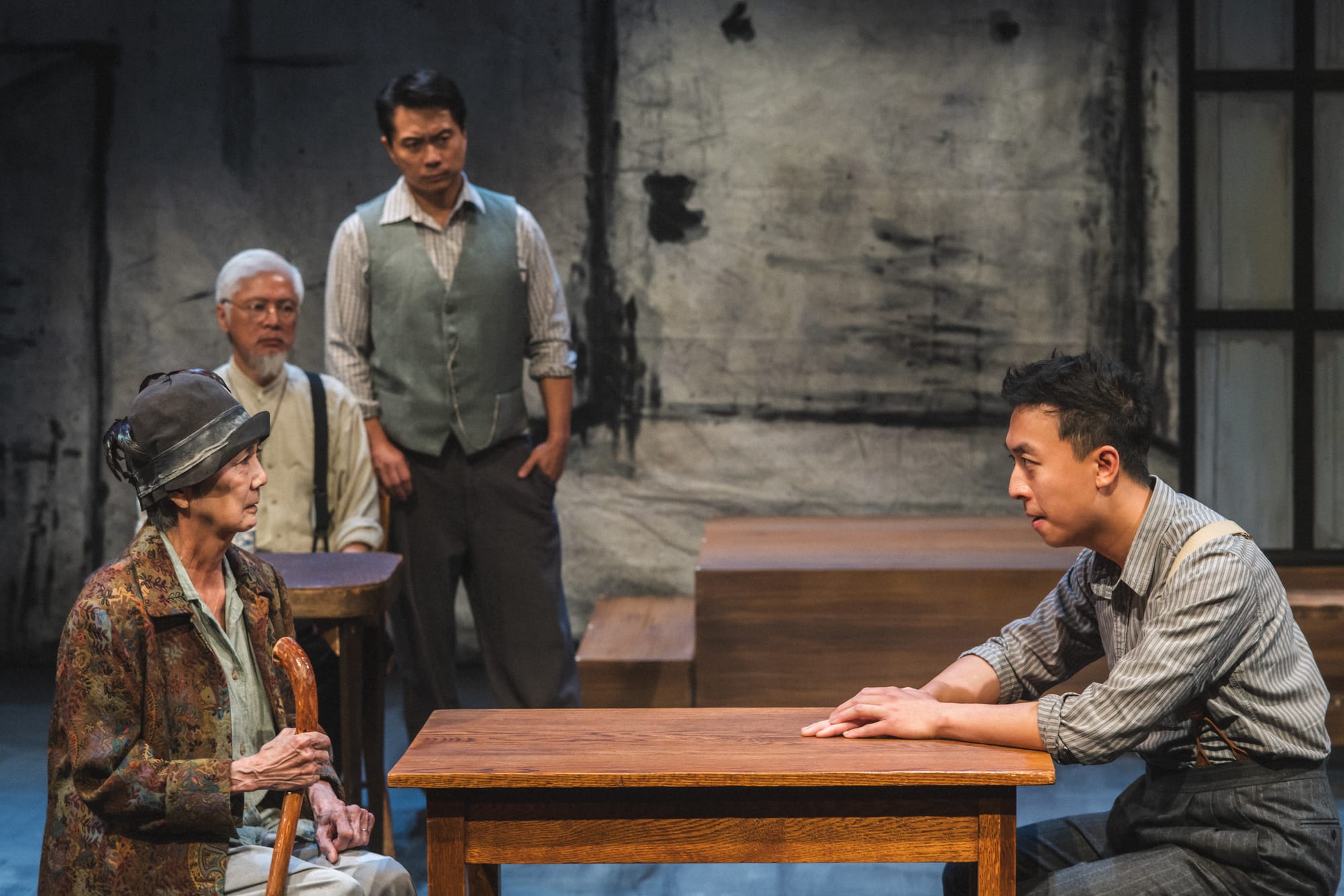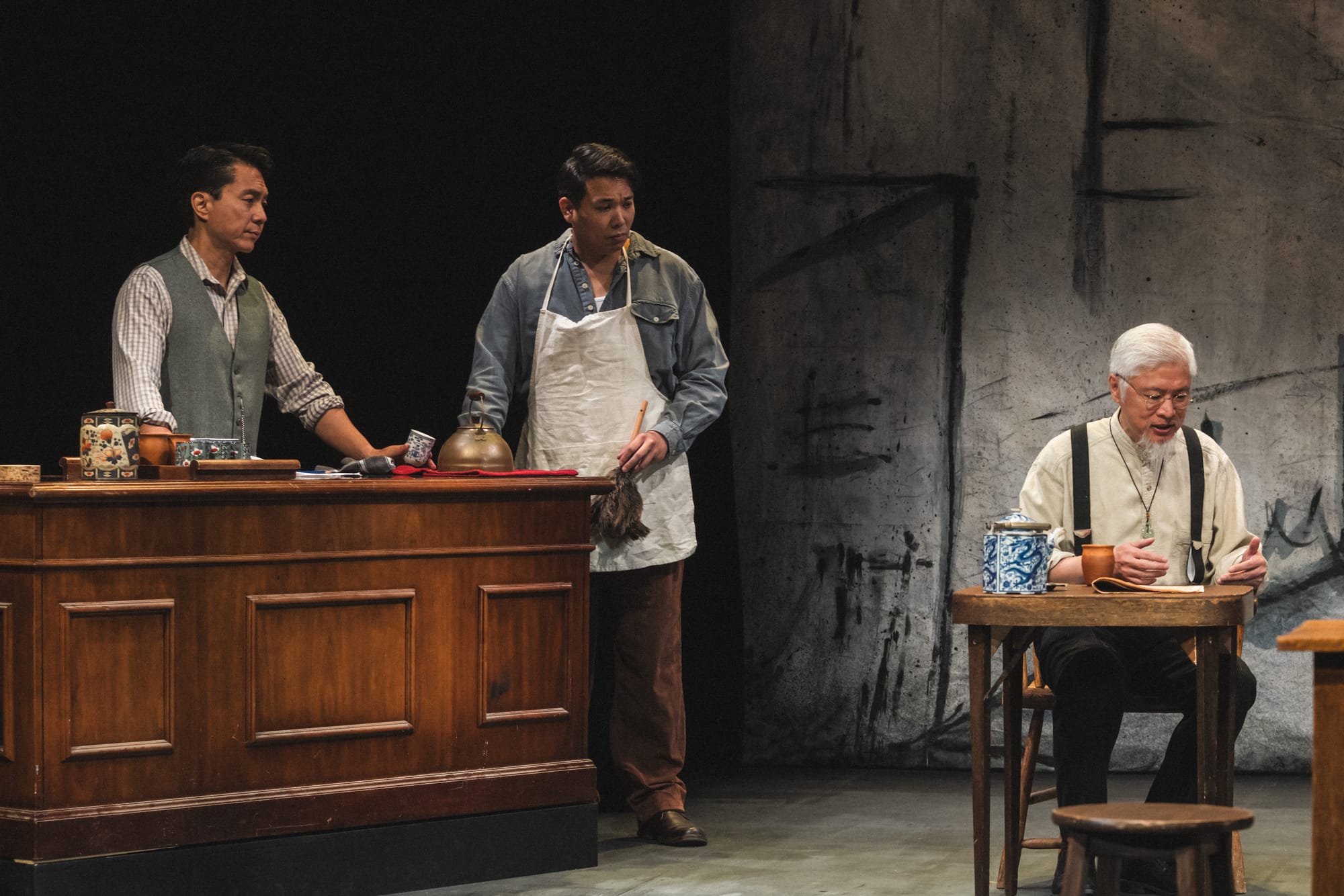Reviews: Bachelor Man, Connections
A little-known Canadian play about Chinese-Canadians in 1920s Toronto gets remounted, and a new musical set at an airport shows promise

The Toronto theatre season ramps up soon — by my count there are seven openings between September 17 to 20 (see specific details here), as well as the start of the Just for Laughs Toronto Festival. I’m anxious just thinking about it. In the meantime, I caught a couple of things at the (calmer) beginning of this month.
I admire Renaissance Canadian Theatre’s mandate: to give Canadian plays and musicals a second chance — sometimes, if they’ve only been workshopped, a first chance. The company’s first production for a paying audience is a staging of Winston Kam’s 1987 play Bachelor Man (Rating: ✭✭✭).
Originally produced at Theatre Passe Muraille, Kam’s play — featuring an all-Asian cast and illustrating a problematic chapter in Canadian history — was clearly ahead of its time.
The setting is Toronto’s Chinatown on July 1, 1929 — i.e., Dominion Day, a national holiday. For the men sipping tea (and sometimes stronger stuff) inside local merchant John’s (George Chiang) tea house establishment, however, it’s a day of humiliation, a painful reminder of their second-class status in this country.
Since 1923, when Canada passed its “Immigration Act” (dubbed the “Exclusion Act”) forbidding Chinese-Canadian men’s wives and families from joining them, they have been alone with themselves, or women who were presumably here before the act was passed.
So the testosterone is high among this bachelor society, who include John’s young helper Asi (Damon Bradley Jang), neighbourhood elder Grandad Lian (Robert Lee), well-educated, mixed-race boarder Kung (Oliver Koomasatira) and neighbouring hangabouts Kao (Sean Baek), a war veteran who lost an arm fighting for Canada in WWI, and Huang (Ziye Hu), who’s best-known for being “man-love,” or gay.
On the periphery are two women: Madame Wu (Renée Wong), the wife of the coffee house owner next door, and Queenie (Brenda Kamino), an elderly street person/sex worker.
Kamino played this same role more than 30 years ago (with lots of aging makeup), and she’s been a big motivating force in this revival. Besides acting in it, she’s directing and she rewrote the script, with help from dramaturg Diana Belshaw.
It’s easy to see why Kamino and RCT’s artistic director, Andrew Moodie, were eager to bring back Kam’s play. While it’s not so rare today as it was in the 1980s or 90s to dramatize the experiences of Asian-Canadians, this period in Canadian history remains largely under-explored theatrically. The setting and focus on a specific marginalized group is particularly unusual. And the way Kam suggests the prejudices — especially the misogyny — many of these men inherited from the old country is chilling.
Kam’s inexperience as a playwright, however, shows in the opening half, in which we’re introduced to all of the characters but don’t get much of a sense of them or what their lives have been like in this urban environment. (To be fair, a couple of months ago, I had a similar problem with the lack of details about Toronto life in a revival of David French’s celebrated play Leaving Home.)

A couple of the characters — especially the proprietor John, whom you might expect to have something significant to say about trying to run a business, and the patriarch Grandad, who helped build the country’s railroad — could use more to do and say. I also thought the character of the mixed-race Kung could have been developed further. In addition, there’s a declamatory feel to the dialogue, without enough context.
The second half is more engaging, especially since a couple of the early plot points — Kao’s loneliness, for example, and the group’s hope that Kung will get the government to get rid of the Immigration Act — pay off. It’s in this second half that we also see the true extent of the culture’s inherent misogyny and the way it has twisted these people’s lives. In one character’s case, this twisting is literal.
As director, Kamino manages the significant stage traffic well enough; many characters come in and out of the tea house (represented by Jackie Chau’s modest set). Lyon Smith’s sound design suggests the distant parade passing by. That said, it’s hard to get a sense of who is rooming in the upstairs rooms, and who is visiting from neighbouring homes.
Kamino also uses music — composed by Smith and sung by Wong from behind a screen — effectively before each scene.
The performances are uneven. Hu brings lots of nuance to Huang, especially in a scene about his marriage back in China to a 15-year-old. And it’s telling that Grandad (played by Lee, who was also in the 1987 production) fumes at the sight of Queenie — suggesting, perhaps, a history between the two.
The role of Queenie is the most interesting one in the script, and Kamino brings lots of colours to this archetypal survivor as she hobbles around with a walking stick, resting her feet and bartering stories for drinks. No mere “rice-cooker” — the men’s sexist term for their wives, as if they have no other purpose — Queenie has made her own kind of life. And Kamino invests her with dignity.
It’s in this character that you get a sense of the kind of insightful play Bachelor Man could have been.
Bachelor Man continues at the Tarragon Mainspace (30 Bridgman) until September 14. See info here.
Musical flight
Last weekend, I also caught Connections — The Musical (Rating: ✭✭✭), a promising new work by Shreya Jha, whose ambitious musical Statistics I enjoyed several years ago at the Toronto Fringe.
Because of inclement weather, various passengers — including a family of four, an engaged couple, and two singles — are stranded at Heathrow airport for an indeterminate period of time.
That gives them the opportunity to hash out what’s going on in their lives. The engaged couple includes Alex (Joëlle Ariana), an influencer, who suddenly begins questioning whether she’s meant to be with her long-distance partner as they head to their wedding in Spain. Meanwhile teen Hallie (Diya Tirone), after discovering that her mom is relocating to California for work, which means she and her younger brother will also have to relocate, leaving their father on the east coast, is acting out. There’s also some inter-personal stuff happening to the airport staff, who are grounded, too.
The book often feels clunky and contrived, and the characters a little thin. Also, too many songs in the first third of the show tell us things instead of showing them. But Shreya is a gifted composer, and many of her songs — including the extremely catchy opening/closing numbers — are richly textured and have a built-in momentum.
Stand-outs in the cast include Tirone, who aces some difficult numbers, and Alex Jodi Verge, who brings a groundedness to her performance as a conflicted mother.
The show, which was produced by 11A Productions, ran September 4 to 6 at the Theatre Centre.
Coming soon: two more Stratford Festival reviews; The Welkin; artists to watch this fall
